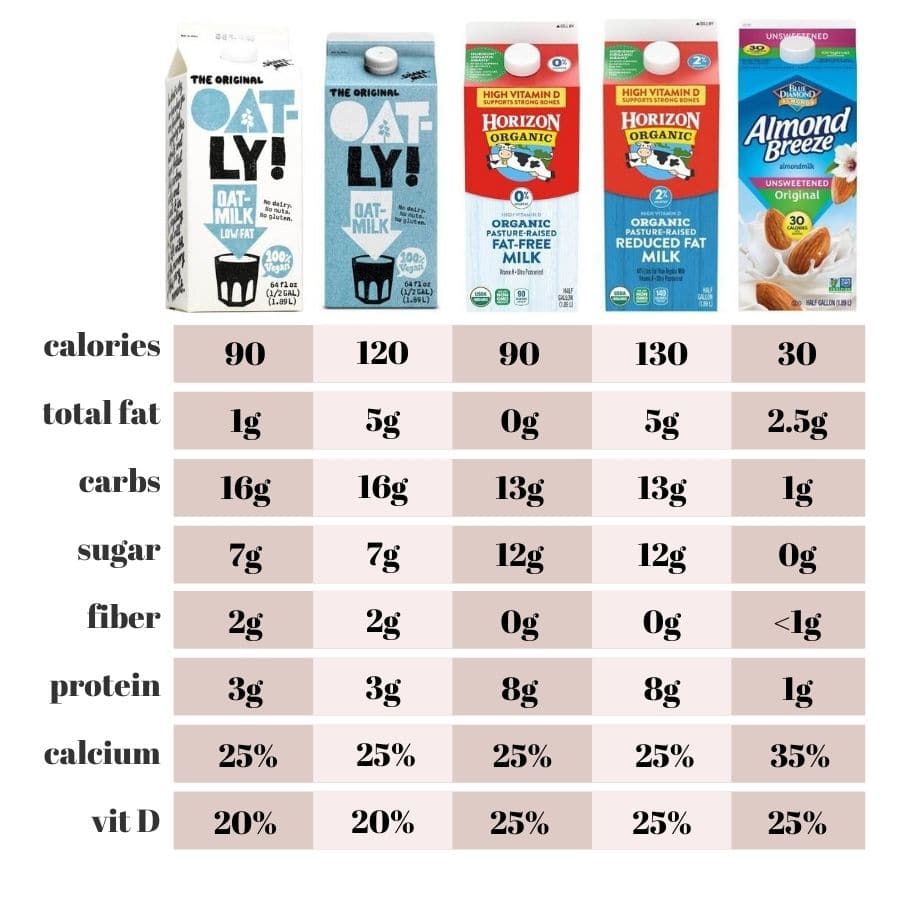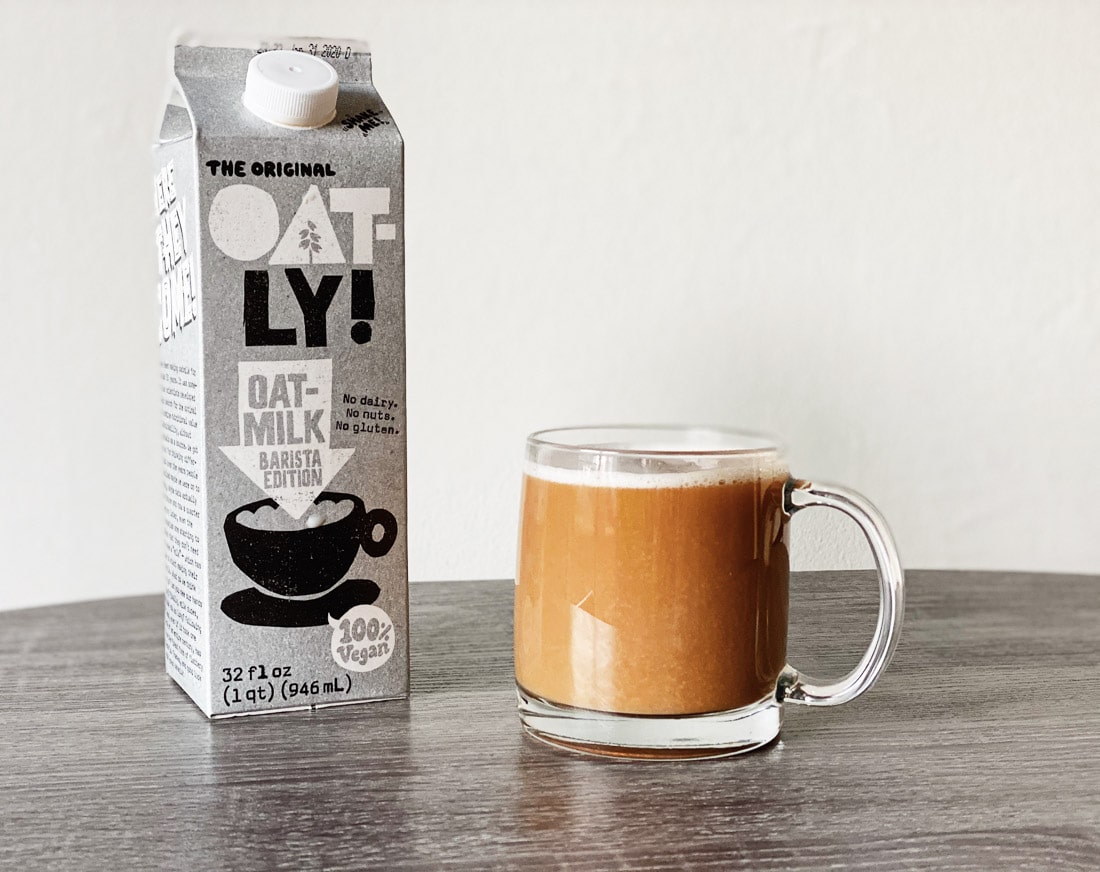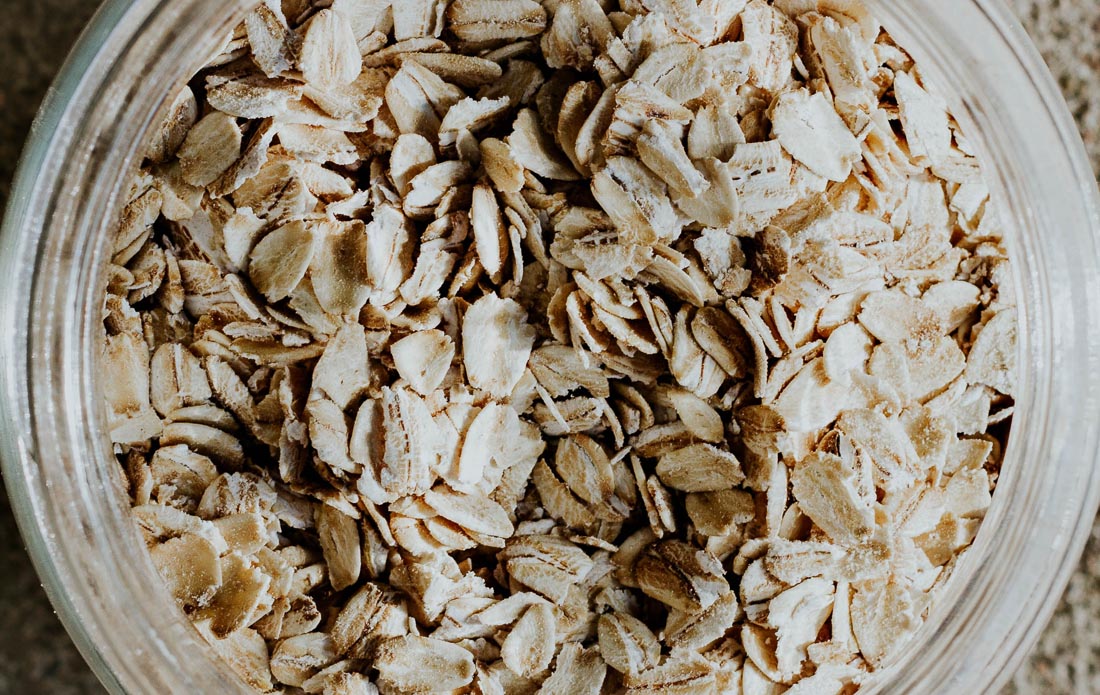Is Oat Milk Good for You? Oat Milk Benefits & Disadvantages
As cow’s milk consumption continues to trend down and the demand for plant-based milks continues to rise, oat milk is now more popular than ever. But are there any benefits of oat milk that make it a superior choice to other dairy-free milks?
Oat milk is the new-ish kid to the plant-based milks block. And let me tell you, its popularity is booming. As a dietitian, I’m getting a lot of questions about oat milk. Is oat milk good for you? What are the benefits of oat milk? And are there any disadvantages of oat milk? Let’s take a look!
Oat milk benefits: is oat milk good for you?
Yes! But like any plant-based milk, the nutrients that oat milk has to offer are not an exact match for dairy milk. Plus, the nutritionals and ingredients vary by brand and variety (i.e. sweetened vs unsweetened, non-fat vs full-fat).
Let’s start with the basics.
What is oat milk made of?
The two main ingredients in oat milk are oats and water. The process of making oat milk is quite similar to that of nut-based milk alternatives, like almond milk and cashew milk. The main ingredient (oats or nuts) is soaked in water, blended, and then strained. However, because oats absorb water more easily than nuts, more of the star ingredient ends up passing through into your milk when strained. Basically, you end up with more oat in oat milk than you do almond in almond milk. This also means you end up with more of the oats’ good-for-you-nutrients, too…
…like fiber! Oats are a rich source of fiber and contain a special kind of soluble, prebiotic fiber called beta-glucan. The special health benefit of beta-glucan is in reducing total and LDL cholesterol (aka “bad” cholesterol). Luckily, one of the benefits of oat milk is that it retains some (but not all) of the fiber naturally found in oats. It also retains some protein, too. We want fiber and protein whenever and wherever we can get them – they’re are a satiating duo!
Oat milk nutrition facts
How does oat milk stack up nutritionally to almond and cow’s milk?
Oat milk vs almond milk: is oat milk better than almond milk?
Remember, oat milk retains more nutrients than nut milk does. While it’s great that oat milk retains more fiber and protein, this also means that oat milk retains more everything, like total carbohydrate. More carbs and more protein means more calories. When comparing the calories in oat milk to almond milk, oat milk contains at least triple the number of calories per serving of almond milk.
Both plant-based milks are fortified with similar amounts of the bone-strengthening micronutrients calcium and vitamin D to mimic what you’d get from cow’s milk.
Oat milk vs cow milk: is oat milk better than cow milk?
One of the greatest oat milk benefits is that out of all the plant-based milks, oat milk is one of the most comparable nutrition-wise to cow milk. If you take a look at the calories in oat milk, it’s pretty spot on with cow milk. The biggest difference here is in the amount of protein – cow’s milk has nearly triple that of oat milk.
Most of the nutrients found in cow’s milk occur naturally, apart from vitamin D and A, whereas many oat milk brands are fortified with a variety of vitamins and minerals, including calcium, vitamin D, vitamin A, riboflavin, and vitamin B12. Oils are also added to some oat milk brands and varieties to mimic the fat content and creaminess of cow’s milk.
Oat milk disadvantages: are there any?
Are there any disadvantages of oat milk or side effects of drinking oat milk to consider? Let’s explore the top concerns:
Oat milk calories
If you take a look at the oat milk nutrition facts above, oat milk is on par with cow milk when it comes to calories. However, most oat milks will contain at least double the amount of calories per cup as unsweetened almond milk, depending on the brand.
Oat milk carbs
Oat milk is higher in carbs than other plant-based milks because, well, oats are naturally higher in carbs. So, if you’re looking for a plant-based, dairy-free milk option while on a low-carb diet, you may want to opt for almond milk or cashew milk instead.
However, more carbs isn’t always a bad thing! Remember, one of the benefits of oat milk is that it’s also higher in fiber, aka the good-for-your-gut carb! The higher carb content of oat milk also makes it taste more like real cow’s milk.
P.S. Want to learn more about carbs? Check out my recent article The Real Facts About Carbohydrates Explained!
Added oils
Some oat milks have added oils to mimic the fat content and creaminess of cow’s milk. For example, Oatly’s Original blend adds rapeseed oil aka canola oil. Canola oil has been getting a lot of heat recently. It’s bad rap stems from 1) the fact that much of the canola oil in the US is genetically modified and 2) concern that canola oil could cause inflammation. Currently, there’s not enough research to support that canola oil is harmful. In fact, some studies even link it to improved health thanks to it’s high concentration of heart-healthy mono- and poly-unsaturated fats.
Regardless, added oils aren’t a reason to avoid oat milks since you can find many options, like Oatly’s Low-Fat Oat Milk and Elmhurst Oat Milk, that don’t add oil. And, for the record, Oatly uses non-GMO rapeseed oil in their Original and Full-Fat oat milks.
Other additives
There’s also some concern over other additives in oat milks, specifically phosphates. Some brands add phosphates (you’ll often see dipotassium phosphate listed) to prevent the oat milk from splitting in hot beverages, like your coffee. This additive has been used and considered safe for a long time and isn’t an issue unless you have kidney disease (in which case you may need to limit intake of minerals like phosphorous).
Oat Milk FAQs
Oat milk sugar content – does oat milk have sugar?
What about the sweet-tasting carb, sugar? Some unsweetened oat milk brands, like Oatly, contain added sugar (you’ll see a number listed in the “added sugar” row of the nutrition label) without sugar being listed on the ingredient list. How could that be?
Here’s how: some oat milk brands add an extra step in their production process to keep the oats from gelling and to yield a less “slimy” final product.
They use natural enzymes to breakdown some of the long carbohydrate molecules (aka starches) in oats into their individual components (aka sugars). Think of these starches like a beaded necklace; the glucose molecules – aka sugar – are the individual beads. The enzymes function as scissors, snipping the long strand of beads into individual beads. This process essentially mimics what happens in your digestive system with your own natural enzymes when you consume starches.
Unfortunately for the oat milk brands that use this enzymatic processing, the new FDA labeling laws requires these *technically* natural sugars released from the oats to be labeled as added sugars, even though they *technically* haven’t added any sugars.
Is oat milk good for weight loss?
Any milk can be incorporated into a weight loss diet, and oat milk is no exception. It does have a some fiber and protein, which support weight loss and weight maintenance. However, it is higher in calories than almond milk and lower in protein than cow’s milk, so it probably wouldn’t be my first choice. If you are looking to lose weight and would like to incorporate oat milk into your diet, I recommend opting for the lower fat version.
Does oat milk contain calcium?
Much like with almond milk, some oat milks are fortified with additional calcium to match the levels of calcium found in cow’s milk (25% of the daily value for calcium). If calcium is a priority to you, be sure to check the label to see if the brand adds calcium.
Is oat milk vegan? Nut-free?
Yes, oat milk is vegan as well as nut-free. So, one of the huge benefits of oat milk is that it’s a great vegan or dairy-free option for those with a nut allergy.
Is oat milk gluten free?
Gluten is a hot topic these days. So, you may be wondering, does oat milk have gluten? Oats themselves are naturally gluten-free. However, oats are subject to cross-contamination with wheat in the fields they’re grown in, in transport, and in processing, unless they are handled and processed in a certain way to avoid cross-contamination.
If gluten-free is a priority for you, be sure to look for certified gluten-free oat milk (or make your own with certified gluten-free oats). These milks use oats that haven’t been subjected to cross-contamination with wheat. Keep reading for a few tips to make delicious oat milk at home!
Can you freeze oat milk?
Yes. It is safe to freeze oat milk, but it is important to know that the texture might be a bit different once thawed, a bit grainy even.
If you have an open container of oat milk that you think might go bad before you have a chance to use it all, try pouring the oat milk into an ice-cube tray and freezing it. When you’re ready for a smoothie, you’ll have the perfect little oat milk ice cubes to blend in.
How to make oat milk at home
If you have access to a blender, oat milk can be incredibly simple to make at home. But the devil is in the details when creating the very best, creamy non-dairy milk while avoiding a slimy texture (gross!).
The biggest factor here is a bit of a goldilocks situation – you need to blend the oat and water mixture just long enough to pulverize the oats but not long enough to create a slimy texture. Tips for success also include using super cold water and even using ice cubes as part of your water mixture.
For most non-dairy milk made at home, you have to soak the ingredients in water overnight to make the creamiest blend. You get to skip this step with oat milk – just blend and go!
To make your homemade oat milk even tastier, you can experiment with adding maple syrup, honey, or even whole dates to sweeten. Vanilla, cinnamon, strawberries, or bananas can be blended together to make your perfect blend.
And if you’re looking for a new breakfast idea, try my Banana Bread Cauliflower Oatmeal recipe with oat milk. Veggies for breakfast that taste like a creamy bowl of banana oatmeal? What’s not to love?
What’s next for oat milk?
As more people are interested in plant-based choices, companies are rising to the occasion. Oat-based yogurt alternatives, ice-creams, and more are here. Food scientists are researching how to make the best products and are experimenting with different processes and even which kinds of bacteria make the thickest yogurt.
Bottom line
If you’re looking for a creamy nut-free, plant-based milk alternative, there are many oat milk benefits that make oat milk a healthy option that can be enjoyed as part of a balanced diet. You’ll even get a few grams of fiber and protein per serving, unlike with almond milk. As for oat milk disadvantages, keep in mind that oat milk also comes with a higher total carb and calorie content (although these aren’t necessarily disadvantages).
Another thing to keep in mind when it comes to selecting an oat milk is added oils. If you’re buying oat milk to use in a smoothie in which you add other fat sources, like avocado or nut butter, I recommend choosing an oat milk that doesn’t have added oil (Low-Fat Oatly and Elmhurst are two great options). If you’re buying it to use in your coffee, you may want to choose one with a little added oil for extra creaminess.
Have you tried oat milk? Let me know if you love it in the comments below!











This was an extremely helpful article on oat milk — thank you for the thorough research and easy-to-read summary!
Thanks so much, Meaghan! I appreciate that you appreciate the research 🙂
I love oat milk, I only have a different milk in a coffee shop if they can’t get hold if oat milk. I like the barista style oat milk as I make mocha drinks at home with my coffee machine.
I did try and make barista style oat milk at home but unfortunately it didn’t work, when I out it under the steaming arm it ended up like porridge. I’d love to find a recioe that works.
I’m glad you love oat milk, Alicia! It’s definitely so tasty in coffee 🙂 Making oat milk at home is tricky because it can get a little slimy, although I don’t usually mind it. But I’ve never tried steaming homemade oat milk and I can imagine that could end up a disaster! Give this top rated oat milk recipe a try: https://downshiftology.com/recipes/how-to-make-oat-milk/ . She talks about using enzymes to help with texture/sliminess, so this may yield a better milk for steaming! Let me know if it works 🙂